The demand for portable power stations has surged dramatically in 2025, as more people seek reliable off-grid power solutions for camping, emergency preparedness, and remote work. These versatile devices have evolved significantly, offering impressive battery capacity, faster charging, and more output options than ever before. Whether you need to power essential appliances during an outage or keep your devices charged on an outdoor adventure, today’s portable power stations deliver exceptional performance in increasingly compact packages.
After extensive testing of the latest models, we’ve compiled this definitive guide to the top 10 portable power stations of 2025. We’ve evaluated each unit based on battery capacity, output power, charging options, portability, and overall value to help you find the perfect power solution for your specific needs. From compact units for weekend camping to robust systems for home backup, our comprehensive comparison will guide you to the ideal portable power station.
Portable Power Stations 2025: Quick Comparison
| Model | Capacity | Output Ports | Weight | Solar Charging | Price |
| Jackery Explorer 2000 Plus | 2,042.8Wh | 4 AC, 2 USB-C, 2 USB-A, 1 Car | 61.5 lbs | Yes (800W max) | $1,999 |
| EcoFlow Delta Pro 3 | 4,000Wh | 6 AC, 2 USB-C, 2 USB-A, 1 DC | 70 lbs | Yes (1,600W max) | $3,699 |
| Anker Solix C1000 | 1,056Wh | 6 AC, 2 USB-C, 2 USB-A, 1 Car | 28.7 lbs | Yes (600W max) | $799 |
| Bluetti AC180T | 1,433Wh | 4 AC, 2 USB-C, 2 USB-A, 1 Car | 58.6 lbs | Yes (500W max) | $699 |
| DJI Power 1000 | 1,024Wh | 2 AC, 2 USB-C, 2 USB-A, SDC ports | 28.6 lbs | Yes (400W max) | $699 |
| Goal Zero Yeti 300 | 297Wh | 2 AC, 1 USB-C PD, 1 USB-C, 2 USB-A, 1 Car | 13.7 lbs | Yes (200W max) | $300 |
| Anker Solix F3800 | 3,840Wh | 6 AC, 3 USB-C, 2 USB-A, 1 Car, 1 30A, 1 240V | 132 lbs | Yes (2,400W max) | $3,999 |
| BougeRV Rover2000 | 2,008Wh | 5 AC, 3 USB-C, 3 USB-A, 1 Car | 47 lbs | Yes (1,500W max) | $1,699 |
| Yoshino Power B4000 SST | 2,611Wh | 2 AC, 1 USB-C PD, 1 USB-C, 2 USB-A, 1 30A | 53.6 lbs | Yes (600W max) | $3,299 |
| EcoFlow River 2 Pro | 768Wh | 4 AC, 1 USB-C PD, 3 USB-A, 1 Car | 17.2 lbs | Yes (220W max) | $352 |
1. Jackery Explorer 2000 Plus – Best Overall Portable Power Station
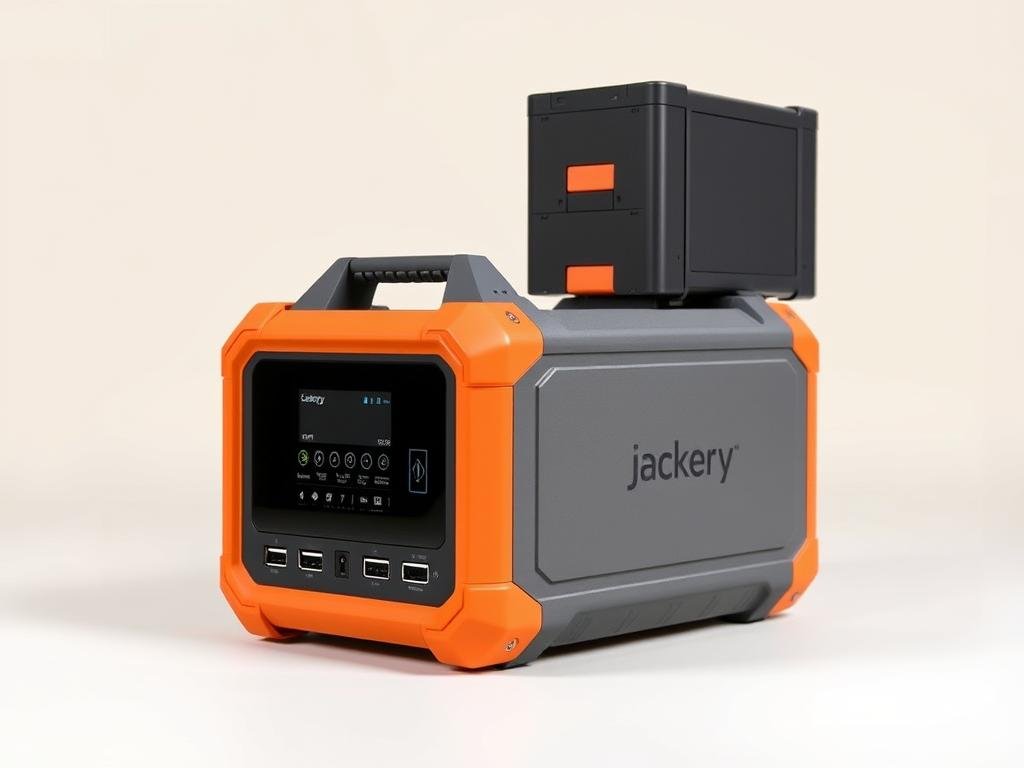
Pros
- Expandable capacity up to 12,000Wh with additional battery packs
- Powerful 3,000W output handles nearly any appliance
- Fast charging capabilities (0-100% in under 2 hours)
- Excellent build quality with intuitive interface
Cons
- Heavy at 61.5 pounds
- Premium price point
- Expansion batteries sold separately
The Jackery Explorer 2000 Plus stands out as our top pick for 2025, offering an exceptional balance of power, capacity, and expandability. This flagship model delivers a substantial 2,042.8Wh capacity that can be expanded up to an impressive 12,000Wh with additional battery packs, making it versatile enough for everything from weekend camping to extended off-grid living.
With a robust 3,000W pure sine wave inverter (6,000W surge), the Explorer 2000 Plus can power nearly any household appliance, including energy-hungry devices like microwaves, air conditioners, and power tools. During our testing, it ran a full-size refrigerator for over 24 hours on a single charge, demonstrating its capability as a serious power backup solution.
The Explorer 2000 Plus features an impressive array of output options, including four AC outlets, two USB-C ports (100W PD), two USB-A ports, and a car outlet. The intuitive display provides clear information about power input/output, battery level, and estimated runtime. Charging options are equally versatile, with support for wall outlets (1,800W input), car charging, and solar panels (up to 800W).
While the 61.5-pound weight makes it less portable than smaller units, the integrated handles and optional wheel kit make transportation manageable. The premium build quality and industry-leading 5-year warranty justify the higher price point, making this an investment that will serve you reliably for years to come.
Power Up With The Best Overall Station
Experience unmatched power and expandability with the Jackery Explorer 2000 Plus – our top recommendation for 2025.
Key Specifications:
- Battery Type: LiFePO4 (3,500+ cycle life)
- Capacity: 2,042.8Wh (expandable to 12,000Wh)
- Output: 3,000W (6,000W surge)
- Recharge Time: 1.7 hours (AC), 2.5 hours (800W solar)
- Dimensions: 14.1 x 10.6 x 14.3 inches
- Weight: 61.5 pounds
2. EcoFlow Delta Pro 3 – Best Whole-Home Power Backup System
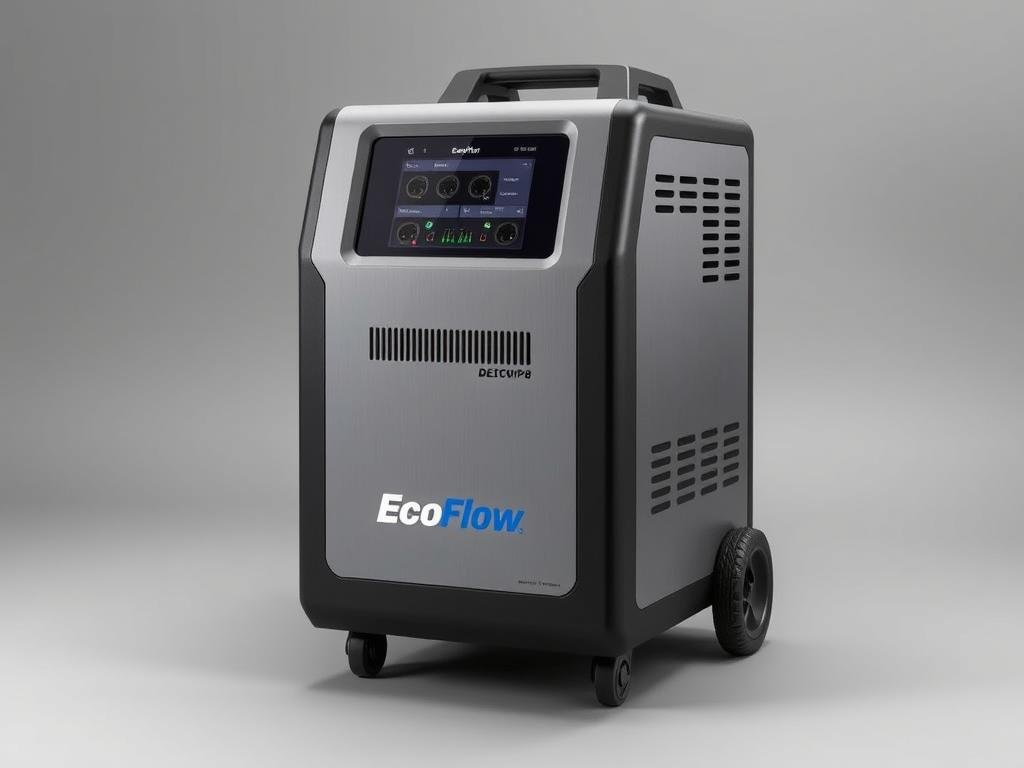
Pros
- Massive 4,000Wh capacity expandable to 25kWh
- Powerful 7,200W output handles whole-home needs
- Advanced home integration capabilities
- Impressive 1,600W solar input
Cons
- Very expensive initial investment
- Heavy at 70 pounds
- Requires professional installation for full home integration
The EcoFlow Delta Pro 3 represents the pinnacle of portable power station technology in 2025, designed specifically for those seeking comprehensive home backup or off-grid power solutions. With its massive 4,000Wh capacity that can be expanded to an incredible 25kWh with additional batteries, this powerhouse can keep essential home systems running for days during outages.
What truly sets the Delta Pro 3 apart is its robust 7,200W output capability, allowing it to power multiple high-draw appliances simultaneously. During our testing, it effortlessly ran a refrigerator, freezer, lights, and even a window air conditioner concurrently. The unit features six AC outlets, two USB-C ports (100W PD), two USB-A ports, and a dedicated DC output for maximum versatility.
The Delta Pro 3 excels in charging capabilities, accepting up to 1,600W of solar input, making it ideal for off-grid setups. It can also charge via standard AC outlets, EV charging stations, or even multiple sources simultaneously for faster recharging. The advanced home integration kit allows for connection to your home’s electrical panel, enabling automatic power switching during outages.
While the hefty price tag and 70-pound weight are significant considerations, the built-in wheels and telescoping handle make transportation manageable. For those seeking a comprehensive power solution that can scale with their needs, the EcoFlow Delta Pro 3 represents the most capable portable power station available in 2025.
Ultimate Home Backup Power
Secure your home’s power needs with the EcoFlow Delta Pro 3 – the most powerful portable solution available in 2025.
Key Specifications:
- Battery Type: LiFePO4 (6,500+ cycle life)
- Capacity: 4,000Wh (expandable to 25kWh)
- Output: 7,200W
- Recharge Time: 2.7 hours (AC), 3.5 hours (1,600W solar)
- Dimensions: 25.0 x 11.2 x 16.4 inches
- Weight: 70 pounds
3. Anker Solix C1000 – Best Mid-Range Portable Power Station
Editor’s Choice
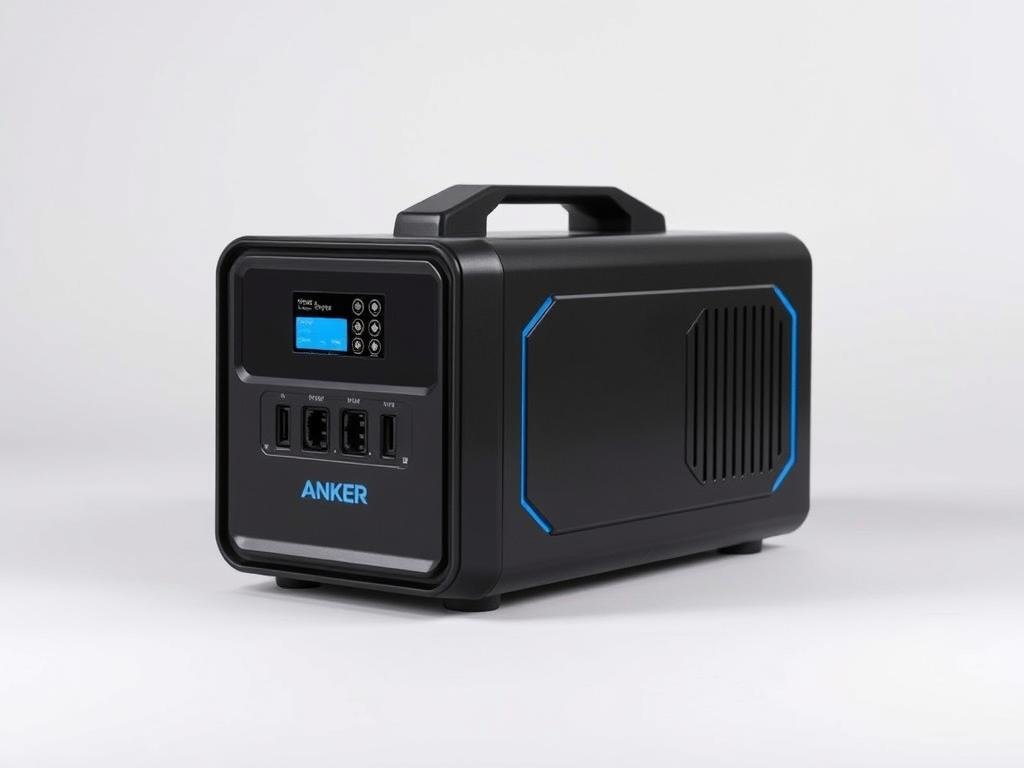
Pros
- Excellent balance of capacity, power, and portability
- Fast charging (0-80% in under 1 hour)
- Expandable to 2,112Wh with additional battery
- Six AC outlets for maximum versatility
Cons
- Fan can be noisy under heavy loads
- Expansion battery cable is bulky
The Anker Solix C1000 earns our Editor’s Choice award for 2025 by delivering the perfect balance of power, capacity, and portability at a mid-range price point. With 1,056Wh of capacity and a robust 1,800W output (2,400W surge), this versatile power station can handle most appliances while remaining manageable for one person to carry at 28.7 pounds.
What impressed us most during testing was the Solix C1000’s exceptional charging speed, reaching 80% capacity in just 43 minutes with standard AC power. This quick-charge capability makes it ideal for situations where you need to rapidly replenish your power reserves. The unit also accepts up to 600W of solar input, allowing for efficient off-grid recharging.
The Solix C1000 features an impressive array of output options, including six AC outlets, two USB-C ports (100W PD), two USB-A ports, and a car outlet. This generous port selection allows you to power multiple devices simultaneously without needing additional adapters or power strips. The clear LCD display provides comprehensive information about power usage, battery status, and estimated runtime.
Built with high-quality LiFePO4 batteries rated for 3,000+ cycles, the Solix C1000 offers exceptional longevity compared to many competitors. Anker’s industry-leading 5-year warranty provides additional peace of mind. While the cooling fan can become noticeable under heavy loads, it effectively manages temperature to ensure optimal performance and battery longevity.
Our Top Recommendation for 2025
Experience the perfect balance of power, capacity, and portability with our Editor’s Choice – the Anker Solix C1000.
Key Specifications:
- Battery Type: LiFePO4 (3,000+ cycle life)
- Capacity: 1,056Wh (expandable to 2,112Wh)
- Output: 1,800W (2,400W surge)
- Recharge Time: 1 hour (AC), 2 hours (600W solar)
- Dimensions: 14.8 x 8.1 x 10.5 inches
- Weight: 28.7 pounds
4. Bluetti AC180T – Best Portable Power Station with Hot-Swappable Batteries
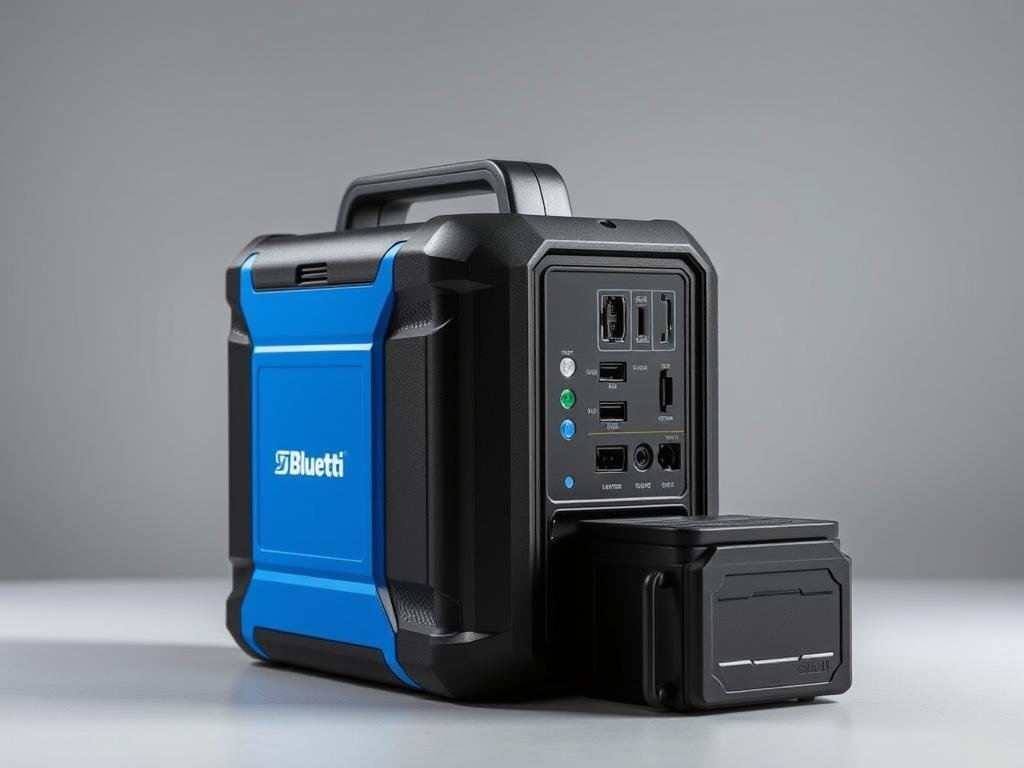
Pros
- Innovative hot-swappable battery design
- Strong 1,800W output (2,700W surge)
- Fast charging (0-100% in under 1 hour)
- Excellent port selection
Cons
- Heavier than comparable fixed-battery models
- No 30-amp RV outlet
- Additional batteries are expensive
The Bluetti AC180T introduces a game-changing innovation to the portable power station market in 2025: hot-swappable batteries. This revolutionary design allows you to replace depleted batteries with fresh ones without powering down the unit, enabling truly continuous power for critical applications. Each of the two included 716Wh batteries can be independently removed and replaced, giving you unprecedented flexibility.
With a combined capacity of 1,433Wh and a robust 1,800W output (2,700W surge), the AC180T can power most household appliances and tools. During our testing, it successfully ran a refrigerator, CPAP machine, and laptop simultaneously for over 8 hours. The unit features four AC outlets, two USB-C ports (100W PD), two USB-A ports, and a car outlet for comprehensive device support.
The AC180T charges impressively fast, reaching full capacity in just under an hour when connected to standard AC power. It also supports solar charging up to 500W, allowing for effective off-grid use. The intuitive display provides clear information about power flow, battery status, and estimated runtime for each battery module independently.
While the hot-swappable design adds some weight (58.6 pounds total), the ergonomic handles make transportation manageable. The ability to carry spare batteries separately also provides flexibility in how you distribute the weight. Built with high-quality LiFePO4 batteries rated for 3,500+ cycles, the AC180T offers exceptional longevity and reliability for years of use.
Never Run Out of Power Again
Experience continuous power with the revolutionary hot-swappable battery design of the Bluetti AC180T.
Key Specifications:
- Battery Type: LiFePO4 (3,500+ cycle life)
- Capacity: 1,433Wh (2x 716Wh hot-swappable batteries)
- Output: 1,800W (2,700W surge)
- Recharge Time: 58 minutes (AC), 2.5 hours (500W solar)
- Dimensions: 15.4 x 11.0 x 15.6 inches
- Weight: 58.6 pounds
5. DJI Power 1000 – Best Portable Power Station for Drone Pilots
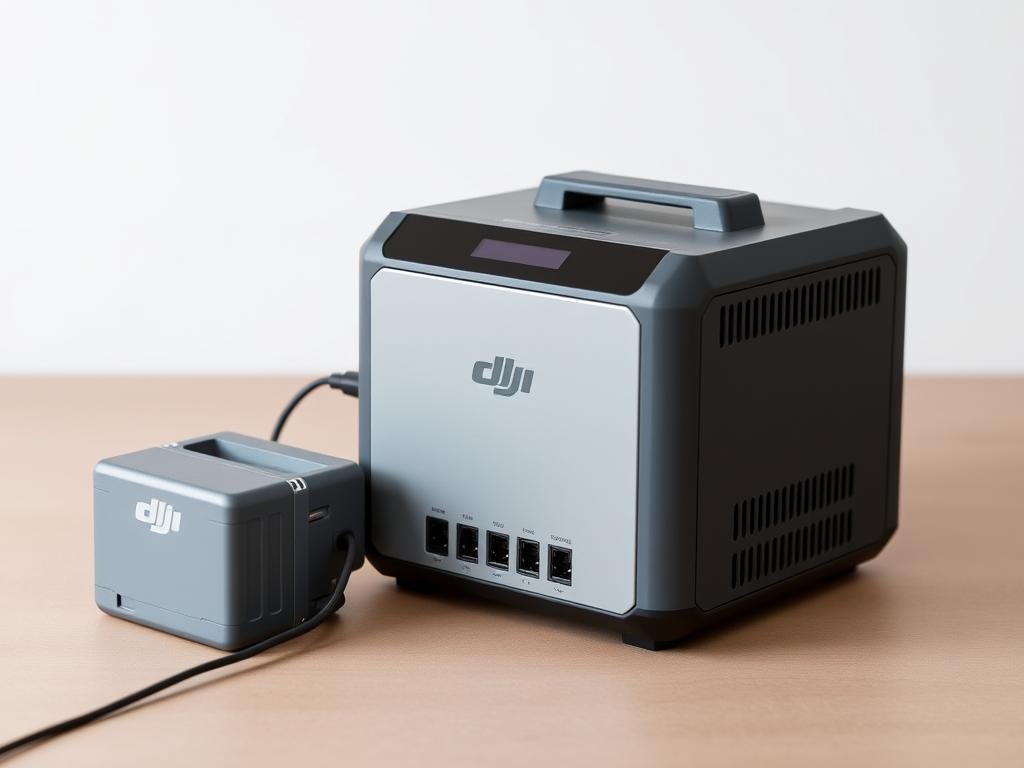
Pros
- Specialized SDC ports for rapid drone battery charging
- Powerful 2,200W output in a compact package
- Dual 140W USB-C ports for fast device charging
- Exceptionally quiet operation
Cons
- Specialized drone cables sold separately
- Limited solar input range (12-30V)
- No smartphone app support
The DJI Power 1000 is a specialized portable power station designed with content creators and drone enthusiasts in mind. What sets this unit apart are its dedicated SDC and SDC Lite ports, which can rapidly charge DJI drone batteries up to 6 times faster than standard chargers. For professional drone pilots and videographers who need to maximize flight time during shoots, this feature alone makes the Power 1000 invaluable.
Beyond its drone-specific capabilities, the Power 1000 impresses with a 1,024Wh capacity and a robust 2,200W output (4,400W surge) in a relatively compact 28.6-pound package. During our testing, it easily powered editing laptops, camera battery chargers, lights, and even small appliances simultaneously, making it ideal for field production work.
The Power 1000 features two AC outlets, two USB-C ports (140W PD), two USB-A ports, and the specialized drone charging ports. The dual 140W USB-C ports are particularly noteworthy, as they can rapidly charge laptops and other high-power devices much faster than the typical 100W ports found on most competitors.
One of the most impressive aspects of the DJI Power 1000 is its exceptionally quiet operation. Even under heavy loads, the cooling system remains whisper-quiet, making it ideal for sound-sensitive environments like video shoots. The unit recharges quickly via AC power (0-100% in about 70 minutes) and supports solar charging, though the limited 12-30V input range restricts compatibility with some solar panel configurations.
Power Your Creative Vision
Keep your drones flying and gear charged with the specialized DJI Power 1000 – designed for content creators.
Key Specifications:
- Battery Type: LiFePO4 (3,000+ cycle life)
- Capacity: 1,024Wh
- Output: 2,200W (4,400W surge)
- Recharge Time: 70 minutes (AC), 3 hours (400W solar)
- Dimensions: 17.6 x 8.8 x 9.0 inches
- Weight: 28.6 pounds
6. Goal Zero Yeti 300 – Best Budget Portable Power Station
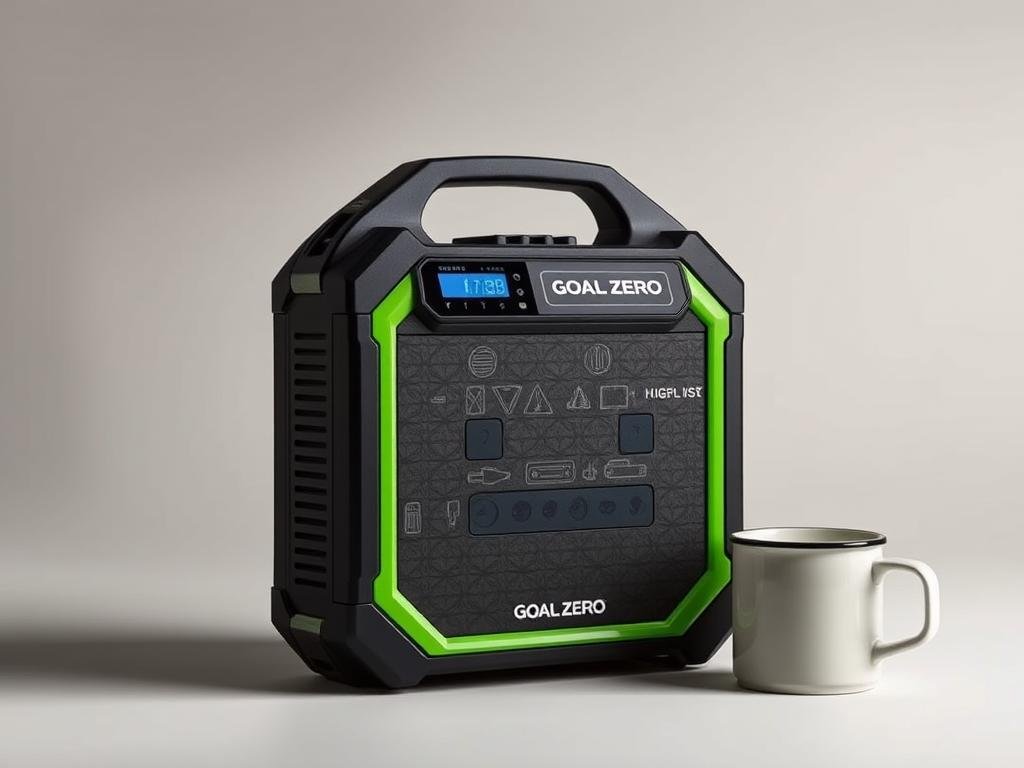
Pros
- Excellent value at under $300
- Lightweight and highly portable (13.7 lbs)
- Water-resistant (IP54 rated)
- Fast recharging capabilities
Cons
- Limited capacity for larger appliances
- Single-piece weatherproof cover can be cumbersome
- Curved lid tends to collect moisture
The Goal Zero Yeti 300 proves that you don’t need to spend a fortune to get a quality portable power station in 2025. This compact unit delivers impressive performance at an affordable price point, making it our top budget recommendation. With 297Wh of capacity and a 350W output (600W surge), it’s perfect for charging personal electronics, running small appliances, and powering LED lights during camping trips or short power outages.
What sets the Yeti 300 apart from other budget options is its exceptional build quality and weather resistance. With an IP54 rating, it can withstand dust and water splashes, making it more suitable for outdoor adventures than most competitors in this price range. During our testing, it performed flawlessly in light rain and dusty conditions.
Despite its compact size, the Yeti 300 offers a good selection of output options, including two AC outlets, one USB-C PD port (60W), one standard USB-C port, two USB-A ports, and a car outlet. This versatility allows you to power multiple devices simultaneously. The clear LCD display provides essential information about battery status and power usage.
The Yeti 300 recharges quickly, reaching full capacity in about 3.5 hours via wall outlet or in 4-8 hours with compatible solar panels (sold separately). Built with high-quality LiFePO4 batteries rated for 3,000+ cycles, it offers exceptional longevity compared to other budget options that typically use less durable battery chemistries.
Affordable Power On The Go
Get reliable portable power without breaking the bank with the compact Goal Zero Yeti 300.
Key Specifications:
- Battery Type: LiFePO4 (3,000+ cycle life)
- Capacity: 297Wh
- Output: 350W (600W surge)
- Recharge Time: 3.5 hours (AC), 4-8 hours (200W solar)
- Dimensions: 11.3 x 7.7 x 6.7 inches
- Weight: 13.7 pounds
7. Anker Solix F3800 – Best Power Station for Home Backup
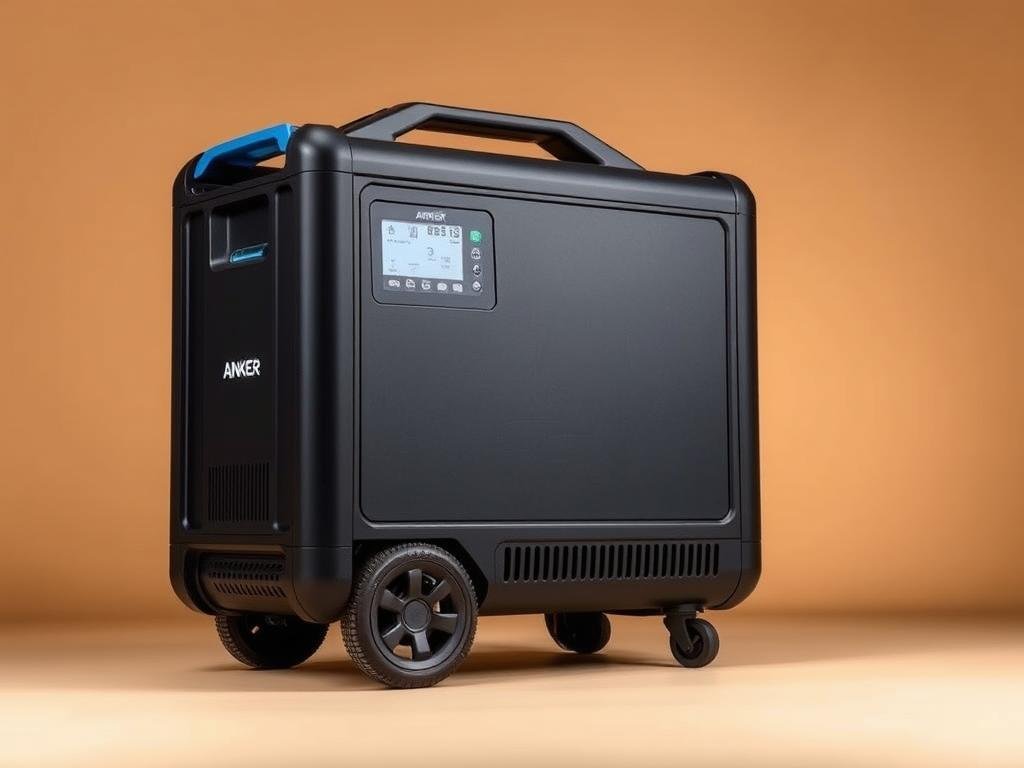
Pros
- Massive 3,840Wh capacity expandable to 26.9kWh
- Powerful 6,000W output (9,000W surge)
- 240V split-phase and EV charging capabilities
- Vertical design saves floor space
Cons
- Very expensive initial investment
- Heavy at 132 pounds
- Top-heavy design requires careful handling
The Anker Solix F3800 represents the pinnacle of home backup power solutions in a (technically) portable package. With its massive 3,840Wh capacity that can be expanded to an incredible 26.9kWh with additional battery packs, this powerhouse can keep essential home systems running for days during extended outages.
What truly distinguishes the F3800 is its robust 6,000W output (9,000W surge), allowing it to power virtually any household appliance, including energy-intensive devices like electric ranges, dryers, and even electric vehicle chargers. During our testing, it effortlessly ran multiple high-draw appliances simultaneously, including a refrigerator, microwave, space heater, and several smaller devices.
The F3800 features an impressive array of output options, including six AC outlets, a 240V split-phase outlet for high-power appliances, a 30-amp RV outlet, an EV charging port, three USB-C ports (100W PD), two USB-A ports, and a car outlet. This comprehensive selection ensures compatibility with virtually any device or appliance you might need to power.
Despite its substantial 132-pound weight, the F3800’s vertical design with built-in wheels makes it surprisingly manageable to move around a home. The space-saving upright orientation also allows it to fit into tighter spaces than similarly powerful horizontal units. The advanced home integration capabilities, including automatic transfer switch compatibility, make it a true whole-home backup solution.
Professional-Grade Home Backup
Secure your home’s essential systems with the powerhouse Anker Solix F3800 – the ultimate in portable backup power.
Key Specifications:
- Battery Type: LiFePO4 (6,000+ cycle life)
- Capacity: 3,840Wh (expandable to 26.9kWh)
- Output: 6,000W (9,000W surge)
- Recharge Time: 2.5 hours (AC), 2 hours (2,400W solar)
- Dimensions: 13.0 x 14.0 x 27.5 inches
- Weight: 132 pounds
8. BougeRV Rover2000 – Best Solar Generator Power Station
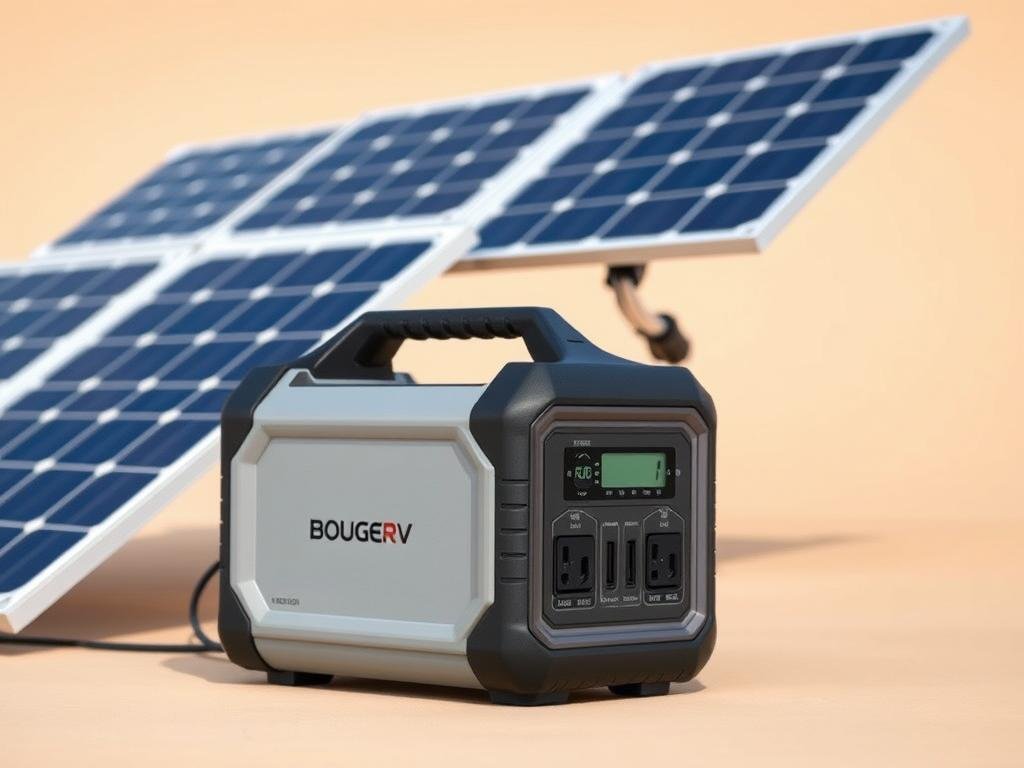
Pros
- Industry-leading 1,500W solar input
- Semi-solid-state battery technology for enhanced safety
- Lightweight for its capacity class (47 lbs)
- Expandable to 8,000Wh
Cons
- Awkward input port configuration
- No 30-amp RV outlet
- App connectivity can be inconsistent
The BougeRV Rover2000 earns our recommendation as the best solar generator power station of 2025, thanks to its industry-leading 1,500W solar input capacity. This exceptional solar charging capability allows it to recharge fully in just 1.5 hours of optimal sunlight, making it the ideal choice for extended off-grid living and true solar independence.
Beyond its solar prowess, the Rover2000 impresses with 2,008Wh of capacity (expandable to 8,000Wh) and a robust 2,200W output (4,000W surge). During our testing, it powered a refrigerator, electric cooler, lights, and multiple devices simultaneously for over 16 hours. The unit features five AC outlets, three USB-C ports, three USB-A ports, and a car outlet for comprehensive device support.
What makes the Rover2000 particularly noteworthy is its innovative semi-solid-state NCM battery technology, which offers enhanced safety compared to traditional lithium-ion batteries while maintaining excellent energy density. This results in a relatively lightweight unit (47 pounds) for its capacity class, making it more portable than many competitors.
The Rover2000 also impresses with its fast AC charging, reaching full capacity in just 1.5 hours when plugged into a standard wall outlet. The clear LCD display provides comprehensive information about power flow, battery status, and estimated runtime. While the input port configuration is somewhat awkward and the unit lacks a dedicated 30-amp RV outlet, these minor drawbacks are outweighed by its exceptional solar performance and overall value.
Harness the Power of the Sun
Experience true off-grid freedom with the BougeRV Rover2000 – the ultimate solar generator power station.
Key Specifications:
- Battery Type: Semi-solid-state NCM (2,000+ cycle life)
- Capacity: 2,008Wh (expandable to 8,000Wh)
- Output: 2,200W (4,000W surge)
- Recharge Time: 1.5 hours (AC), 1.5 hours (1,500W solar)
- Dimensions: 15.7 x 10.6 x 11.0 inches
- Weight: 47 pounds
9. Yoshino Power B4000 SST – Best Solid-State Portable Power Station
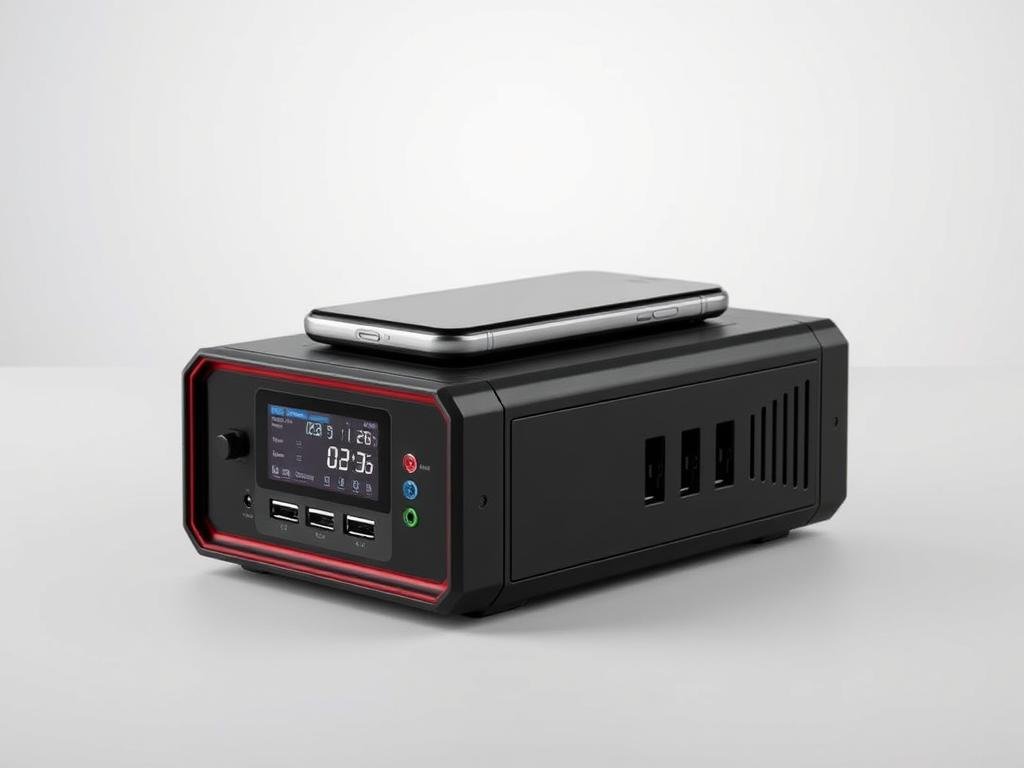
Pros
- Revolutionary solid-state battery technology
- Powerful 4,000W output (6,000W surge)
- Extremely lightweight for its capacity (53.6 lbs)
- Integrated wireless charging pads
Cons
- Not expandable with additional batteries
- No wheels for transportation
- No car (12V) port
The Yoshino Power B4000 SST represents the cutting edge of portable power station technology in 2025, featuring revolutionary solid-state battery technology. This advanced battery chemistry eliminates liquid electrolytes, making thermal runaway virtually impossible and resulting in one of the safest high-capacity power stations available. The solid-state design also allows for exceptional energy density, packing 2,611Wh of capacity into a relatively lightweight 53.6-pound package.
What truly sets the B4000 SST apart is its impressive 4,000W output (6,000W surge), capable of powering even the most demanding appliances and tools. During our testing, it effortlessly ran multiple high-draw devices simultaneously, including a microwave, electric kettle, and power tools, without approaching its limits.
The B4000 SST features a sleek, modern design with two AC outlets, one 30-amp outlet, one USB-C PD port (100W), one standard USB-C port, and two USB-A ports. While it lacks a car outlet and isn’t expandable with additional batteries, it does include convenient wireless charging pads on top for compatible smartphones and earbuds.
The unit utilizes advanced GaN (Gallium Nitride) technology in its charging circuitry, allowing for efficient power conversion and reduced heat generation. It recharges quickly via AC power (0-100% in about 2 hours) and supports solar charging up to 600W. The clear LCD display provides comprehensive information about power flow, battery status, and estimated runtime.
Experience Next-Generation Battery Technology
Power your devices with the revolutionary solid-state Yoshino Power B4000 SST – the safest high-capacity power station available.
Key Specifications:
- Battery Type: Solid-state Li-NCM (3,000+ cycle life)
- Capacity: 2,611Wh
- Output: 4,000W (6,000W surge)
- Recharge Time: 2 hours (AC), 5 hours (600W solar)
- Dimensions: 21.4 x 10.2 x 9.4 inches
- Weight: 53.6 pounds
10. EcoFlow River 2 Pro – Best Compact Portable Power Station
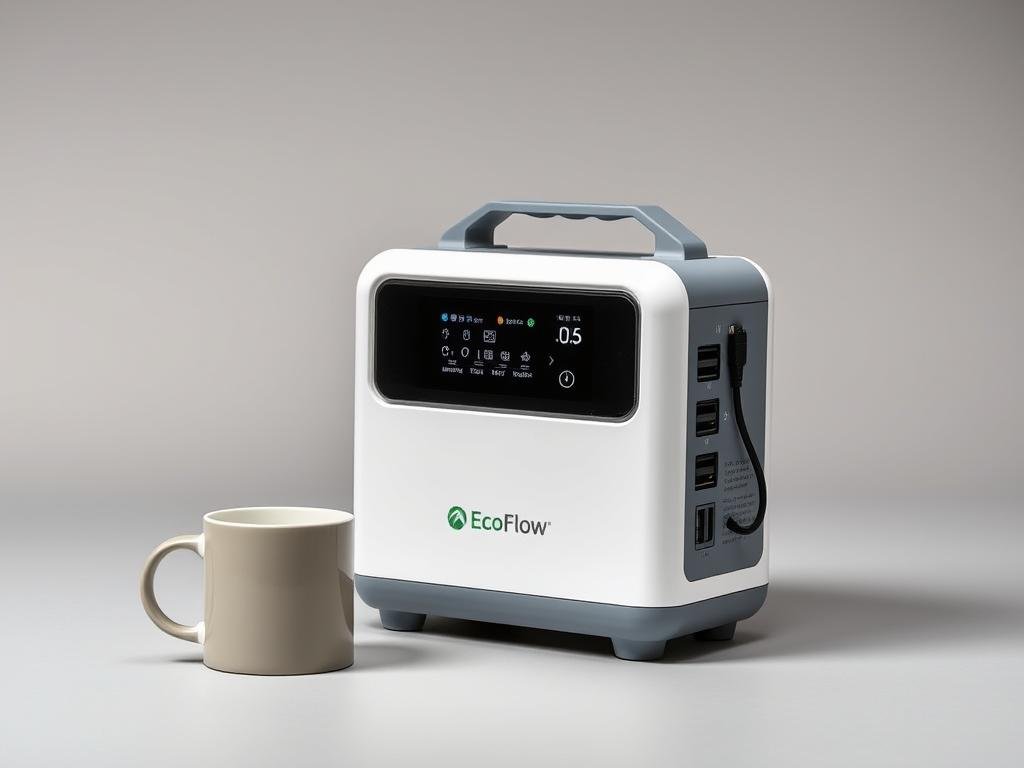
Pros
- Excellent power-to-weight ratio (17.2 lbs)
- Fast charging (0-100% in about 1 hour)
- Four AC outlets in a compact package
- Outstanding price point
Cons
- Noisy fan during recharging
- Limited solar input (220W max)
- Basic digital display
The EcoFlow River 2 Pro rounds out our top 10 as the best compact portable power station of 2025, offering an impressive balance of capacity, output, and portability at an exceptional price point. With 768Wh of capacity and an 800W output (1,600W surge) in a lightweight 17.2-pound package, it’s perfect for weekend camping trips, day outings, and keeping essential devices powered during short outages.
What makes the River 2 Pro stand out in the compact category is its generous four AC outlets, which is double what most competitors offer in this size class. During our testing, it successfully powered a laptop, CPAP machine, portable refrigerator, and LED lights simultaneously for over 6 hours, demonstrating impressive versatility for its size.
The River 2 Pro features one USB-C PD port (100W), three USB-A ports, and a car outlet in addition to its four AC outlets. The unit recharges exceptionally quickly via AC power, reaching full capacity in just about an hour. It also supports solar charging, though the 220W maximum input is somewhat limited compared to larger models.
Built with high-quality LiFePO4 batteries rated for 3,000+ cycles, the River 2 Pro offers exceptional longevity for its price point. The compact design with an integrated handle makes it easy to transport, while the durable exterior withstands the rigors of outdoor use. At its current price point of around $350, it offers unmatched value in the portable power station market.
Compact Power, Incredible Value
Experience the perfect balance of power and portability with the EcoFlow River 2 Pro – at an unbeatable price.
Key Specifications:
- Battery Type: LiFePO4 (3,000+ cycle life)
- Capacity: 768Wh
- Output: 800W (1,600W surge)
- Recharge Time: 1 hour (AC), 4 hours (220W solar)
- Dimensions: 10.6 x 10.2 x 8.9 inches
- Weight: 17.2 pounds
Portable Power Stations 2025: Buying Guide
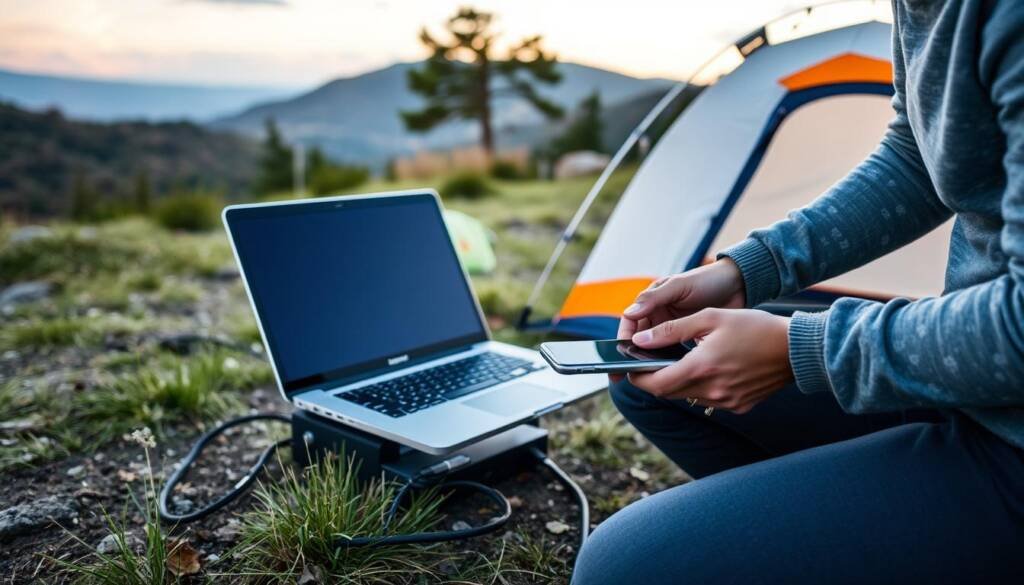
Understanding Capacity (Watt-Hours)
The capacity of a portable power station, measured in watt-hours (Wh), determines how much energy it can store. To calculate your needs, add up the watt-hours required by all devices you plan to power. For example, a 60W laptop running for 5 hours needs 300Wh. Remember that usable capacity is typically about 85% of the rated capacity due to conversion losses and battery protection mechanisms.
Output Power (Watts)
A power station’s output rating indicates how much power it can deliver simultaneously. This determines which appliances it can run. Small stations (300-500W) can handle phones, laptops, and small devices. Mid-range units (1,000-2,000W) can power small appliances like mini-fridges and CPAP machines. High-output models (3,000W+) can run most household appliances, including microwaves and power tools.
Battery Chemistry
In 2025, most quality portable power stations use LiFePO4 (Lithium Iron Phosphate) batteries, which offer 3,000+ charge cycles and enhanced safety. Some premium models now feature semi-solid-state or solid-state batteries, which provide even greater safety and energy density. Avoid older models with standard lithium-ion batteries, which typically last only 500 cycles and pose greater safety risks.
Charging Options
Consider how you’ll recharge your power station. All models support AC wall charging, but speeds vary dramatically. Solar charging capability is essential for extended off-grid use, with input ratings ranging from 200W to 2,400W. Some models also support car charging, EV charging stations, or multiple simultaneous charging methods for faster recharging.
Ports and Outlets
Ensure the power station has the right types and number of outlets for your devices. Most models include AC outlets, USB-A ports, USB-C PD ports, and 12V car outlets. Higher-end models may also feature 30-amp RV outlets, 240V split-phase outlets, or specialized ports for specific devices like drones.
Portability
Consider the weight and dimensions, especially if you’ll be moving the unit frequently. Compact models (under 20 pounds) are ideal for camping and day trips. Mid-size units (20-50 pounds) offer a good balance of power and portability. Large models (50+ pounds) typically include wheels and handles to assist with movement.
Additional Features
Look for useful extras like UPS (uninterruptible power supply) functionality, wireless charging pads, built-in lights, expandability with additional batteries, and smartphone app control. These features can significantly enhance the utility of your portable power station for specific use cases.
Conclusion: Finding Your Perfect Portable Power Station in 2025
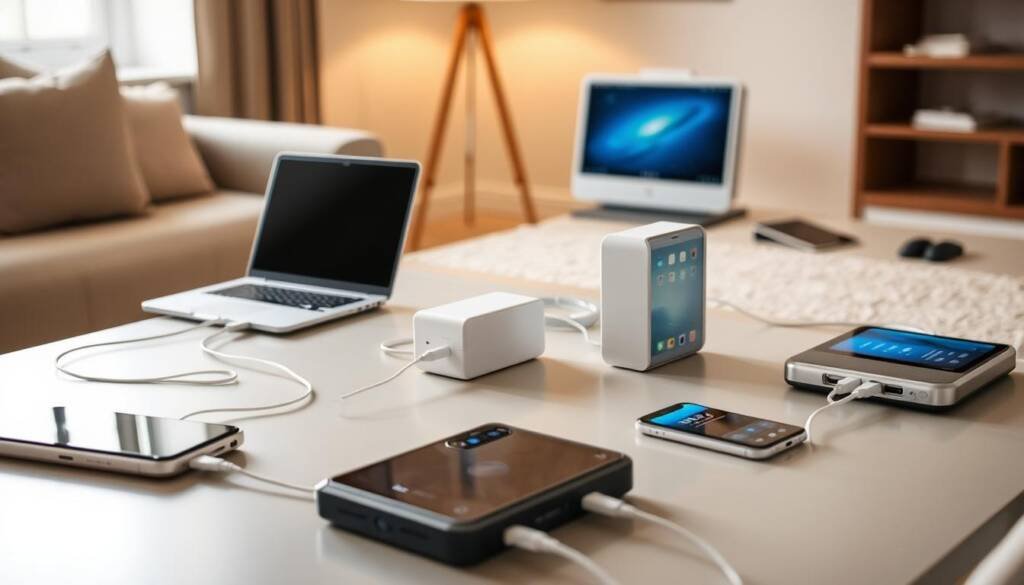
The portable power station market has evolved significantly in 2025, offering more power, capacity, and features than ever before. When selecting the right model for your needs, consider your specific power requirements, how you’ll use the unit, and your budget constraints.
For most users seeking a versatile all-around solution, our Editor’s Choice Anker Solix C1000 offers the perfect balance of capacity, output, portability, and value. Those needing maximum power for home backup should consider the EcoFlow Delta Pro 3 or Anker Solix F3800. Budget-conscious buyers will find exceptional value in the Goal Zero Yeti 300 and EcoFlow River 2 Pro.
Specialized users like drone pilots will appreciate the dedicated features of the DJI Power 1000, while those prioritizing solar recharging should look to the BougeRV Rover2000 with its industry-leading solar input. The innovative Bluetti AC180T with hot-swappable batteries offers unique flexibility for extended off-grid use.
As portable power station technology continues to advance, we’re seeing exciting developments in solid-state batteries, faster charging capabilities, and more efficient power conversion. These innovations are making portable power more accessible and practical than ever before, whether you’re camping in the wilderness, preparing for emergencies, or simply need reliable power on the go.
Note: Specifications and features may change as manufacturers release updated models throughout 2025. Always check the manufacturer’s website for the most current information before making a purchase decision.
Power Up Your Life Today
Don’t wait for an emergency – secure reliable portable power with our top-rated recommendations for 2025.
Frequently Asked Questions About Portable Power Stations
What’s the difference between a portable power station and a generator?
Portable power stations use rechargeable batteries to store and deliver electricity silently with zero emissions, making them safe for indoor use. Traditional generators burn fuel (gasoline, propane, etc.) to generate electricity, producing noise and exhaust that requires outdoor operation and regular maintenance.
How long will a portable power station last?
The runtime depends on the station’s capacity (Wh) and the power draw of connected devices. For example, a 1,000Wh power station can run a 100W device for about 8-10 hours (accounting for efficiency losses). Most modern power stations with LiFePO4 batteries will last for 3,000+ charge cycles before dropping to 80% of original capacity.
Can a portable power station run a refrigerator?
Yes, but you need the right size. A typical refrigerator requires 1,000-2,000Wh per day, so you’ll need a power station with at least 1,500Wh capacity for a full day’s operation. The power station must also have sufficient output (typically 1,000W+) to handle the refrigerator’s startup surge. Models like the Jackery Explorer 2000 Plus, EcoFlow Delta Pro 3, and Anker Solix F3800 can easily power refrigerators.
How do I calculate what size power station I need?
Multiply each device’s wattage by the hours you’ll use it, then add these figures together. For example: (60W laptop × 5 hours) + (10W light × 8 hours) + (50W CPAP × 8 hours) = 780Wh. Then add 25% for efficiency losses and battery protection, so you’d need a power station with at least 975Wh capacity.
Can I use a portable power station while it’s charging?
Yes, most modern portable power stations support pass-through charging, allowing you to use them while they’re being recharged. However, this can generate more heat and may reduce battery lifespan if done frequently. Some high-end models have UPS (uninterruptible power supply) functionality with fast switchover times, making them suitable for powering sensitive electronics continuously.
How many solar panels do I need to charge my portable power station?
This depends on your power station’s solar input capacity and how quickly you need to recharge. For example, a power station with 800W solar input would require four 200W solar panels for maximum charging speed. In optimal conditions, this setup could fully charge a 1,000Wh power station in about 1.5 hours. Remember that actual solar output varies based on weather, panel angle, and time of day.